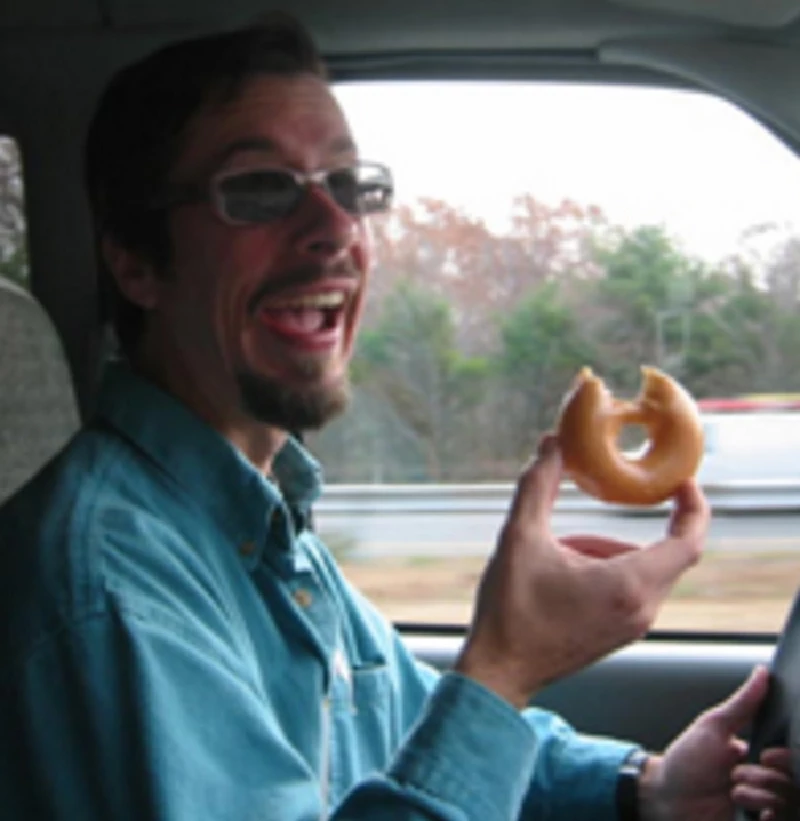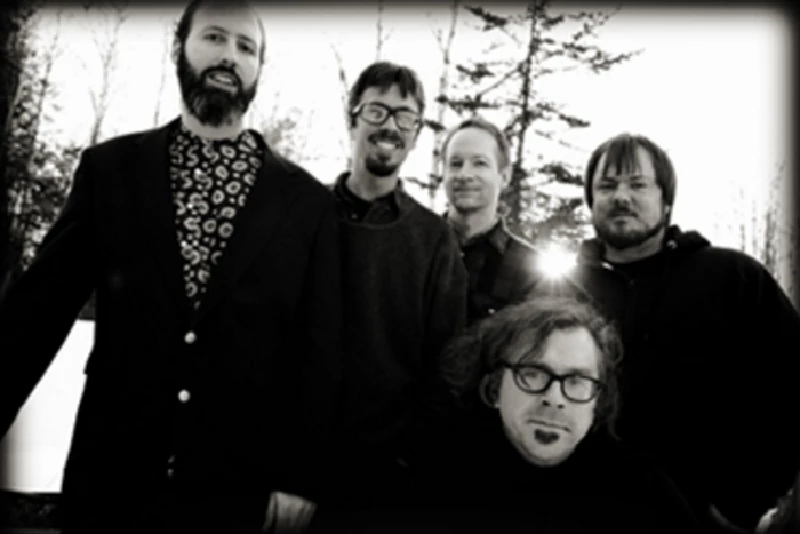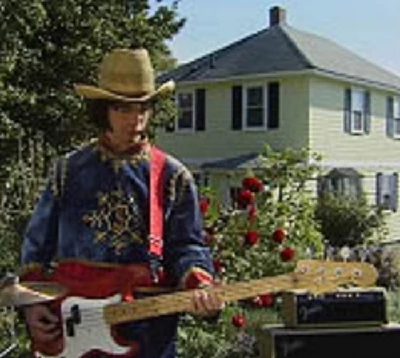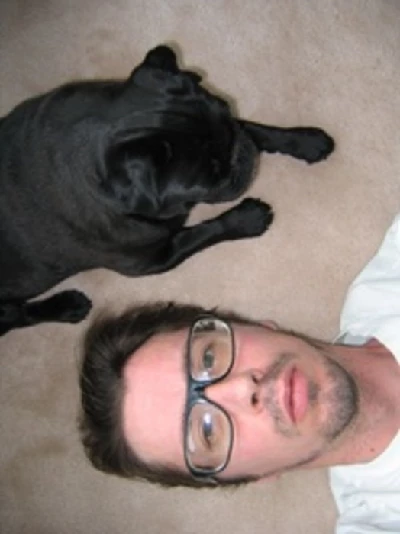Pete Weiss - Interview
by John Clarkson
published: 12 / 2 / 2007

intro
Producer, engineer and mixer Pete Weiss, back for a third interview with Pennyblackmusic, chats to John Clarkson about his new open concept studio Verdant which is based in New England, and his current three very different groups, the Weisstronauts, Sool and Orange Nichole
Pete Weiss is a New England-based producer, engineer and mixer. In a career that expands back over 20 years, Weiss has worked with internationally renowned artists which include the Willard Grant Conspiracy, Chris Brokaw, former Velvet Underground members Doug Yule and Moe Tucker, Aimee Mann, Levon Helm from the Band and Sonic Youth's Lee Ranaldo, as well as "indie" talents such as Magic 12, Paula Kelley, Charlie Chesterman and Seks Bomba. In 1989, he co-founded Zippah Studio in Boston, but in 2004 sold his share of it to build and open a new "open concept" studio, Verdant Studio, in rural Vermont which he also uses as a home base. While he is now firmly based in Vermont, Weiss, who is also a musician, maintains his Boston ties, and currently plays in three groups, his own instrumental surf/country/lounge outfit the Weisstronauts, experimental pop collective Sool, and folk/pop group Orange Nichole, all of whom remain centered there. Last year was an especially busy year for Weiss in his musical career. The Weisstronauts' released their third album, 'Featuring "Perky"', following on from their 2001 album 'Featuring "Jaunty" and 2003 record 'Featuring "Spritely"', and also toured the North Eastern States with Doug Yule, temporarily replacing regular member Kevin Quinn, on bass. Sool, which again features Quinn and also Neal Spaulding, put out five years on from their eponymous debut their second record 'Sooltime', and also saw the independent film, 'Bad Gravity', for which they provided the soundtrack, released. Orange Nichole, which Weiss joined more recently and for which he plays bass rather than his regular guitar and keyboards, also released their second album, 'Things We've Got and Things We're Winning'. Pennyblackmusic, back for a third interview with Weiss, spoke to him about Verdant, and managing his three bands and also his production career. PB : It has been four years since Pennyblackmusic last spoke to you. You were still at that stage the owner of Zippah which you had co-established and run for many years. You have now sold up and opened a new studio, Verdant, in Vermont. Why did you decide to sell your share of Zippah and to start afresh ? PW : I haven’t left Boston entirely and I still actually do sessions at Zippah. I am just not an owner anymore. The main reason that I decided to sell my share of Zippah was because real estate was getting very expensive in Boston. Our rent just kept going up and up and up. That was coupled with the fact that people aren't recording as much in recording studios anymore. We were getting less work than we had had in the 90's, which was the golden age of Zippah, and so for that reason I decided I need to rethink things. Zippah is a pretty small studio too, and I had always found that a limitation. My wife and I, therefore, started looking at real estate in Vermont, which is only two and a half hours from Boston and is fairly close to New York as well. Real estate is quite a lot cheaper in Vermont. It is quite beautiful up there, and we thought that maybe we could take out a loan and build something there,and it would be really cool, and so that is what we did. The idea with Verdant is to provide musicians and artists with a retreat, a place where their cell phones don't work, and they can just concentrate on music, and stay for four or five days. PB : And how successful has that been ? You seem to have attracted a lot of your old clients and also some new ones. PW : It was a big life decision and a big career decision, and one which I was fairly intimidated by, so I spent a good deal of time quizzing my old clients and asking them "Well, theoretically if I built this type of thing, and it was a studio which was just as good as Zippah but it was out in the woods, would you consider coming out there for a project and spending a few days ?" Most of them said yes, but some of them said they couldn't afford to do that. I was glad to hear that. I was glad for the truth and the hard fact that it is asking a lot from people to come out that far. The nice thing about it, however, is that it has attracted very serious musicians who put their music first, who are prepared to find the time to take five days off their day jobs or whatever and to live up there and to work at their music exclusively. It has been going fairly well. PB : Is your house in Vermont attached to the studio ? PW : It is in a separate building. My wife and I live in a small cottage next to it. The studio is a sprawling, converted barn. There is an art studio in there which my wife uses and also a couple of guest bedrooms. It is very, very nice. We often regret that we can't live in the studio (Laughs) and are across in the draughty house. PB : It is described as an open concept studio. What does that mean ? PW : That means that there is not the traditional separation between the control room and the live studio. It is a movement that has been gaining a lot of popularity. Wavelab Studios in Tucson, Arizona has been doing that for a while. Daniel Lanois, the Canadian producer, is also a big procurator of open concept studios. The advantage is that everyone is in the same room, and the engineer and the producer can react with a band in a more organic and more immediate way. The disadvantage is that you lose a little bit of sonic control, but there are ways around that. You just have to spend a little more time getting things right. What I do is record a snippet of a type of sound and then play it back, and then tweek it and move the microphone, and then play a snippet of it again and adjust it that way. PB : You also shifted your old BBC Neve console out of Zippah and took it up to Vermont with you. Why did you decide to take that with you rather than perhaps buying or building a new system ? PW : Just because I love that console so much. I am emotionally and technically attached to it. I depend on it as a tool. There is no way that you can get that sound other than through using Neve gear. It has become part of my bona fides of life. PB : You have said that you still spend a lot of time in Boston. All three of your current bands are also based there. How much of the time do you spend there and how much time do you spend in Vermont ? PW : It depends on what is going on. It can be a bit confusing. I don’t know where I am waking up sometimes (Laughs). My wife and I still own a house in Boston. We rent out most of it to tenants and friends, but we keep a bedroom there, so we have a place to stay in Boston. Sometimes it is 50/50 depending upon how busy the studio is, but most of the time it is a lot less than that. PB : You've had three albums out in the last year, one from each of your three different groups. One of those albums is the Weisstronauts’ 'Featuring Perky’. When Pennyblackmusic last spoke with you, you were just beginning work on that album and planning it to have a lot of vocals, but it is, like its two predecessors, another predominantly instrumental album. Why did you choose to put out another instrumental album ? PW : That is something that I think about from time to time. It is just so strange. After my last group Pete Weiss and the Rock Band folded, I creatively decided that I was going to start a brand new band and get in it a bunch of people who were really good singers and that we were going to do songs that had a lot of vocal harmonies, and I just don’t know what happened (Laughs). I pulled all these great musicians together. They were great friends of mine and they still are and we started jamming and developing songs, and, before I knew it we had about eight instrumental songs, all of which had just sort of appeared. We had lots of vocal songs too, but everyone contributes in the band and kept coming to rehearsals and saying “I’ve got this fun instrumental. Do you want to try it ?” I think fun is the operative word. We all get such a kick out of it. Concentrating on our guitar playing wasn’t part of the plan, but that started developing and ever since then I have ended up thinking “Why fight it ?” PB : The band has been through since a lot of line-up changes since we last spoke to you. Yourself, Kevin Quinn and Ken Lafler (guitar-Ed) all remain, but Aaron Tap and Emily Jackson (guitar and drums-Ed) have both gone. Aaron moved to California with his wife (Singer-songwriter Paula Kelley-Ed) and has been replaced by George Hall, the former guitarist with Seks Bomba and the subject of a one-time Pennyblackmusic interview. Why did you decide to involve him ? PW : I had recorded Seks Bomba many times and I had become friendly with George and had admired his warped view of a wide range of music. He can also do certain things with a guitar that I don’t know anyone else who can do. He is also a big Weisstronauts fan and had always made it clear that if we ever needed any help that he would be there for us, so he seemed to be the person to ask before anyone else us. It always helps to be friends with band mates before you become band mates (Laughs). PB : Why did Emily leave ? PW : Emily moved back to Indiana. PB : She has been replaced by not one, but three drummers, Nathan Logus, Jeff Berlin and Jeff Norcoss. What is the story there ? PW : It was proving really difficult to nail down a drummer who was not incredibly busy with other aspects of his life, so it is pretty good that we have three who we can call on whenever we have a gig or a rehearsal or a recording session. Usually at least one of them will be free will do it. An interesting thing that has just arisen is that Jeff Norcoss and Nathan Logus also play bass. The pair of them have also taken it upon themselves to learn most of the Weisstronauts songs on bass as well as drums, and so both those two guys are now also available to be our substitute bass players as needed. PB : Why has this album taken so long to come out ? There’s been a long gap between it and the two other Weisstronauts records. PW : It was because I was mostly in Vermont. As I was in Vermont it was just difficult to get our schedules to line up. PB : The group has recently toured with Doug Yule on bass. It was his first set of gigs in nearly 30 years. How did you manage to persuade him to tour with you after such a long absence from playing live ? PW : I recorded him about eight years ago and I have remained friends with him ever since. He is a very personable guy and he recently moved to Ithaca in New York State which is not too far from where I am in Vermont. When Kevin Quinn announced he couldn’t do the tour and I found our substitute guys couldn’t do it either, I created a list of untried bass substitutes and Doug was on the list almost as joke. I didn’t think he would be able to do it, but he does freelance work, so I thought “Maybe, I’ll give it a try” and I owed him a phone call, so I called him and rang it past him and I said “Listen, Doug ! Here’s the deal. We’re going to do this. It’s going to be 10 days on the road. The band is not really a money making band and if we make any profit after our expenses we’ll split it between all the members, but what usually happens is the van rental and the meals eat up all the income. There is a very good chance we won’t be able to pay you at all and plus we’ll be staying with friends and sleeping on people’s floors and couches”. And so I just decided I would tell him all the bad things about it and he said “Okay, let me check my calendar. That sounds great to me.” PB : How did he enjoy the experience ? PW : He said he really enjoyed it. He said that it was the best tour that he was ever on (Laughs). PB : ‘Sooltime’, the second Sool album, came out last year. The first Sool album, 'Sool', was recorded really quickly and in the space of three days. Was the second Sool album recorded as quickly ? PW : No, that was recorded in fits and starts. We like to set up rules and parameters for our songwriting in Sool or at least our conceptualising. It gives us a little goal, and we came up with this idea that all the songs would be roughly one minute, which was a good rule to work with. The other rule that we came up with was that we shouldn’t labour too hard on any song. A lot of the songs were created in the studio or written very quickly. We had one major session which yielded about 15 of those songs. We all met up in Vermont and had a very creative few days which created a backbone for the album. From then on we paired off two and sometimes three at a time. There was also a geographical challenge. Neal Spaulding was at the time living pretty far away in North Carolina, so we would send things to him, tracks or CDs to add to, and he would send things up to us and I would mix them up. 'Sooltime' involved a lot of US postal service action. PB : Often, when you get an album with lots of short tracks, they are just snippets of music and ideas. The majority of the songs on ‘Sooltime’ are, however, actual songs. Was that another criteria for making the record ? . PW : That was a less rigid requirement. That was more of a general goal because we thought it would make it a higher quality. We came to the conclusion that there is nothing wrong with a one minute song even if the chorus plays once. You can always just hit repeat. If you need the song you can just play it again. It doesn't need to rely on so much actual repetition. A lot of the songs on 'Sooltime' have a verse, a chorus, a bridge and even a solo, and we are really proud of the fact that we have got it all packed into one thing. PB : The Weisstronauts and Sool compliment each other quite well, because you have got one band, which is largely instrumental, and another band which involves lots of vocals. Is that one of the joys in playing in both bands, in that while they have some similarities in that they both have a strong sense of humour and both feature you and Kevin Quinn, they are in other ways radically different ? PW : Yes. While the Weisstronauts is more controlled, I think there is an element of chaos with Sool sometimes. Even in the light of what I said about the one minute rule, there are alternately fewer rules for Sool. Any musical style is fair game. It is okay to do instrumentals. It is okay to do five part harmonies. It is okay to do garage rock. PB : You said that Neal Spaulding was in North Carolina at the time you recorded 'Sooltime'. Has he moved any nearer you other guys since then ? PW : Yeah, luckily, he just moved to Maine to take up a teaching job there. He now lives about two hours away from Boston. It is not perfect (Laughs), but it is manageable. PB : Have you been able to play more gigs together more regularly as a result ? PW : We play one show a month in the Boston area. For the live version of Sool we actually have a back-up band. The idea is that the three main Sool guys stand up and sing and occasionally play the tambourine and dance a little bit (Laughs) and we have a back-up band which actually involves a couple of the guys from the Weisstronauts and another friend of ours, Mercy James. They do the bulk of the instrumental backing, which frees us up to concentrate a little more on the singing. Some of the harmonies are a little tricky. It is pretty goofy visually and I think pretty entertaining for the audience. PB : Sool also provided the soundtrack to the independent film ,‘Bad Gravity’. How did that come about ? PW : We were lucky in that Scott Morabito, the guy who directed ‘Bad Gravity’, was looking for music for the film and was given a pile of vocal CDs by someone that worked at a local radio station in Boston. The Sool one happened to be in the pile and he liked that one the best. He connected it with it and liked its humour and the pop element and its eclecticness. He e-mailed us and asked if we would be interested in providing the soundtrack and we said of course. PB : You also play bass with Orange Nichole, who have just released their second album, 'Things We've Got and Things We're Winning'. How did you become involved with them ? PW : I go way back with Nichole Clarke, who is the singer and songwriter in that band. Nichole and her now husband John Clarke and I used to play in a band, Penguin, in Boston about 10 years ago. The lead guitarist in Penguin, Dave Egan, died sadly of cancer a few years ago, and that was obviously the end of that band. Nichole who had moved out of town eventually moved back into town and got back in touch and said that she would like to do some recording. We recorded as a band at Vermont for the first time, with John on drums and Jamie Edwards, who also plays piano regularly with Aimee Mann, on guitar and keyboards, learning the songs as we went along. Then a few yards along the block she wound up getting a gig for the band. We found that we really enjoyed it, and so it has become a real thing. PB : Are you going to be doing their third album with them ? PW : Nichole writes songs deliberately and quite slowly, and she is the first one to joke about it. She says that she needs a good eight years to come up with an album’s worth of songs (Laughs). That is not quite true, but when she does write songs they are always excellent and never need any more work on them. I don't think we will do another album this year, but maybe next year. We need to wait for her to assemble a few more songs PB : And finally what plans do you have for the future ? PW : Just to keep working with better and better artists. I want to help keeping people make great music. PB : Will there be more music from both the Weisstronauts and Sool ? PW : Yeah, definitely. The Weisstronauts are getting ready to develop some more material. We’re thinking about introducing synthesisers to keep things from getting stale and to open up some new avenues. Sool will also keep working and playing gigs .The plan is to flesh out some of the material we recorded for ‘Bad Gravity’. We have talked about parameters for the next album and the plan is not to do the one minute thing again and to get away from that and to go back to more of a two and a half or three minute pop format as we had on the first album. PB : Thank you for your time.
Picture Gallery:-

interviews |
|
Interview (2002) |

|
| Pete Weiss is one of the most important and influential members of the Boston independent music scene. An established and highly respected record producer, mixer and engineer, he is the co-owner of Zi |
profiles |
|
Pete Weiss (2011) |

|
| John Clarkson finds Vermont-based producer and musician Pete Weiss to have moved away from his surrealist humorous past and to be in more serious frame of mind on both his bands, the Weisstronauts and Sool's latest EPs, 'The Wisstronauts in Memphis' and 'A Touch of Sool' |
reviews |
|
Pete Weiss And The Rock Band (2001) |
| Pete Weiss is an established Boston producer and engineer, and has worked with acts such as ‘The Willard Grant Conspiracy’, former ‘Velvet Underground’ members Doug Yule and Mo Tucker , ‘The Magdalene |
most viewed articles
current edition
John McKay - InterviewRobert Forster - Interview
Cathode Ray - Interview
Spear Of Destiny - Interview
Fiona Hutchings - Interview
When Rivers Meet - Waterfront, Norwich, 29/5/2025
Carl Ewens - David Bowie 1964 to 1982 On Track: Every Album, Every Song
Chris Wade - Interview
Brian Wilson - Ten Songs That Made Me Love...
Shrag - Huw Stephens Session 08.12.10 and Marc Riley Session 21.03.12
previous editions
Heavenly - P.U.N.K. Girl EPBoomtown Rats - Ten Songs That Made Me Love....
Allan Clarke - Interview
Manic Street Preachers - (Gig of a Lifetime) Millennium Stadium, Cardiff, December 1999
Oasis - Oasis, Earl's Court, London, 1995
Barrie Barlow - Interview
Dwina Gibb - Interview
Beautiful South - Ten Songs That Made Me Love...
Pixies - Ten Songs That Made Me Love...
Sound - Interview with Bi Marshall Part 1
most viewed reviews
current edition
Peter Doolan - I Am a Tree Rooted to the Spot and a Snake Moves Around Me,in a CircleVinny Peculiar - Things Too Long Left Unsaid
Garbage - Let All That We Imagine Be The Light
Vultures - Liz Kershaw Session 16.06.88
John McKay - Sixes and #Sevens
Little Simz - Lotus
HAIM - I Quit
Morcheeba - Escape The Chaos
Eddie Chacon - Lay Low
Billy Nomates - Metalhorse
Pennyblackmusic Regular Contributors
Adrian Janes
Amanda J. Window
Andrew Twambley
Anthony Dhanendran
Benjamin Howarth
Cila Warncke
Daniel Cressey
Darren Aston
Dastardly
Dave Goodwin
Denzil Watson
Dominic B. Simpson
Eoghan Lyng
Fiona Hutchings
Harry Sherriff
Helen Tipping
Jamie Rowland
John Clarkson
Julie Cruickshank
Kimberly Bright
Lisa Torem
Maarten Schiethart